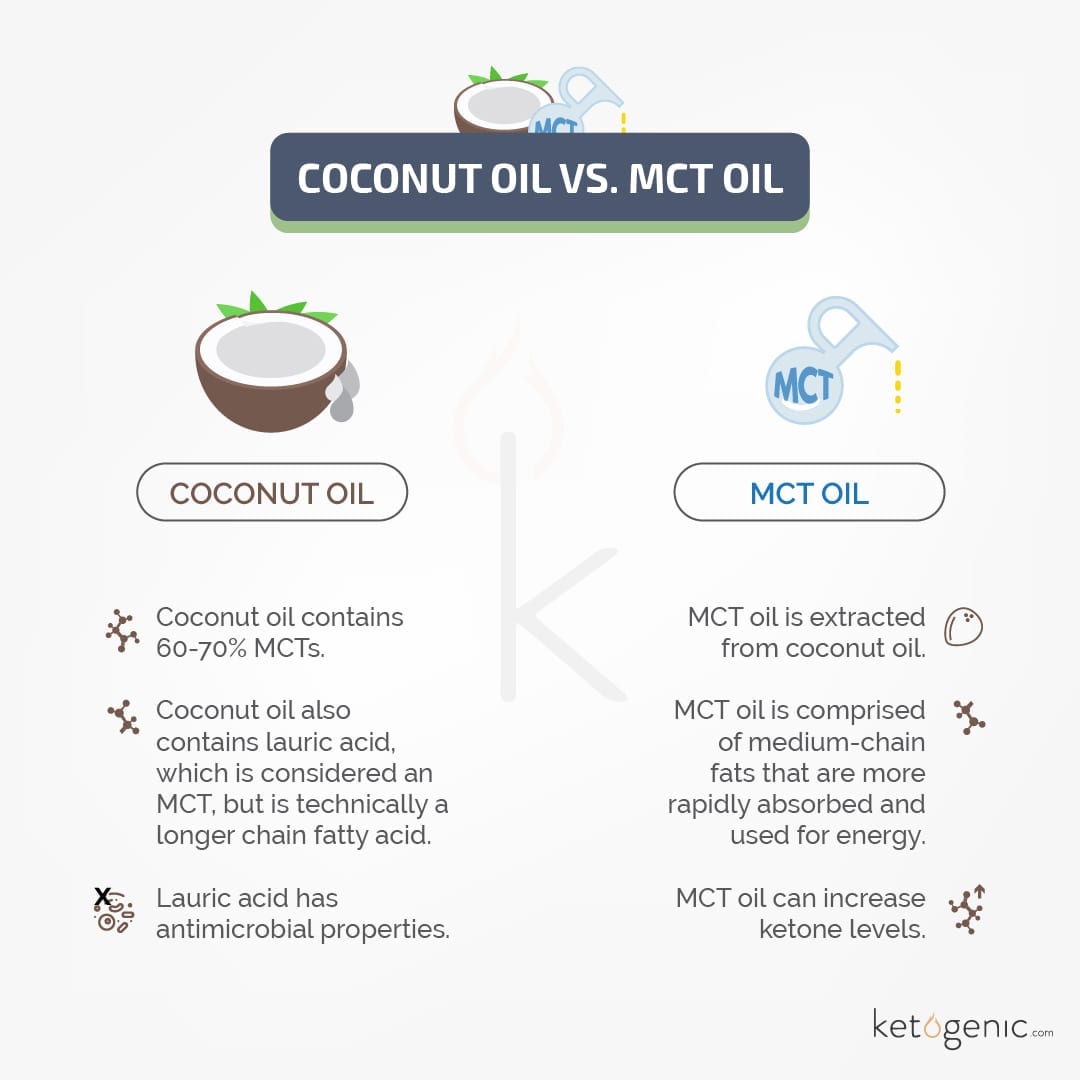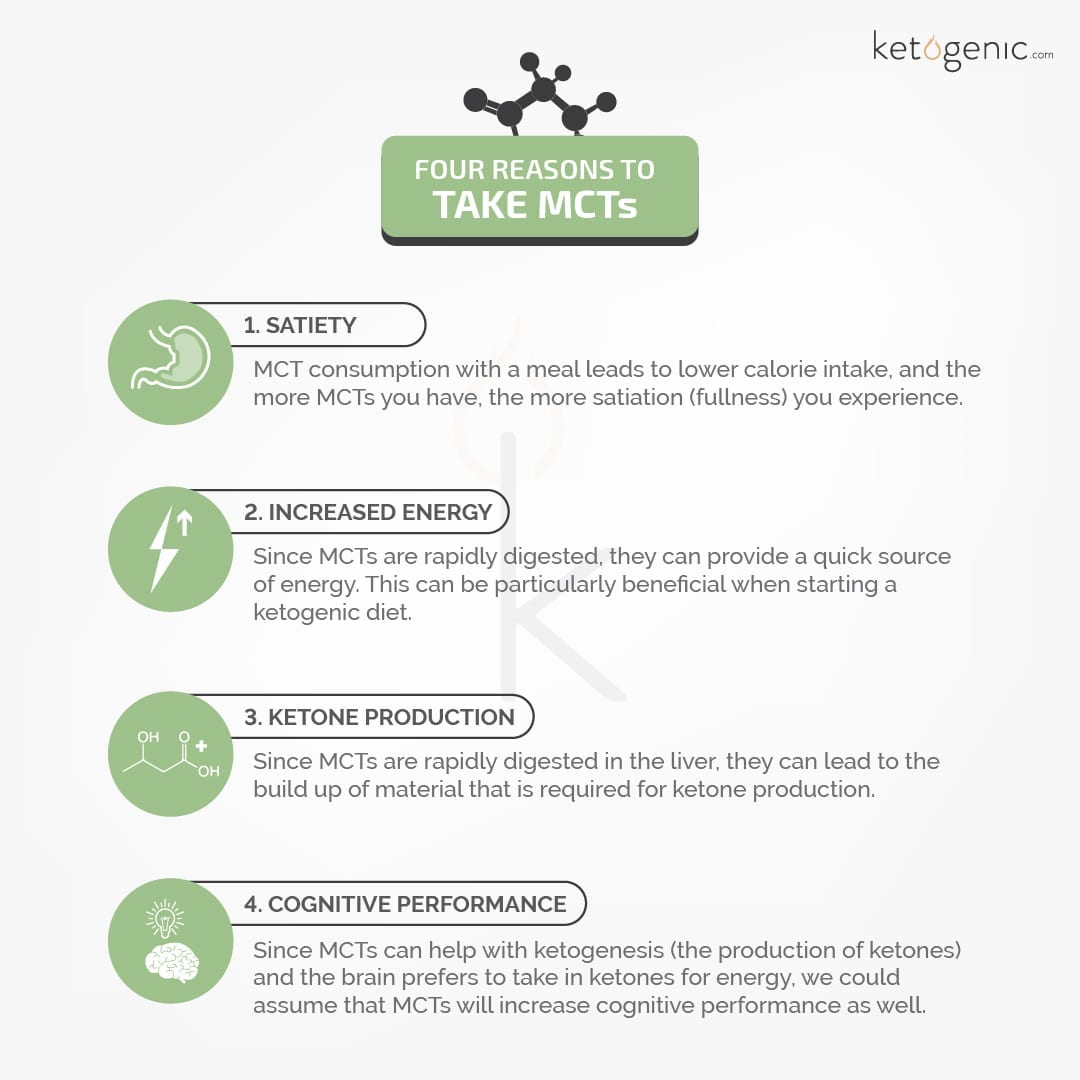
What is MCT Oil?
MCT oil or medium-chain triglyceride oil is typically derived from the coconut. Triglycerides are groups of three connected fatty acids. The fatty acid chains in MCT oil are shorter than those found in most other fats, such as vegetable oil.
The fat particles in MCT are so beneficial partly because you digest and absorb them more quickly than other fats. They’re also easier for your liver to convert into ketones. MCT oil is an excellent way to add more healthy, natural fat into your ketogenic lifestyle.

Should You Have MCT Oil or Powder While Fasting?
Here are various points to consider when it comes to MCT oil and fasting:
If you’d like a strict fast, you might refrain from taking any supplements, including MCT oil. On the other hand, you might decide to use MCT oil to see how it makes you feel and how it affects your progress and goals. You won’t know until you try it.
Using MCT oil while fasting might require more consideration if you’re trying to lose weight. While MCT oil has been shown to promote weight loss and beneficial bacteria in the gut, some people believe if you have weight loss goals, you should refrain from consuming any type of fat when you’re fasting. The idea is that when you fast, you mostly use your own body fat for energy since there’s no other energy coming in, and the more outside fat (like MCT oil) you consume while fasting, the less fat your body will need to burn from your fat stores. A longer fast can ramp up fat burning!
It’s also worth noting that MCT oil can banish hunger pangs, which could be helpful for weight loss and stop you from consuming a big high-calorie meal and giving in to your cravings. Countless people report using MCT oil while fasting didn’t raise fasting blood sugar levels. Research suggests MCT oil doesn’t affect fasting insulin levels, and it actually improves insulin sensitivity, making insulin work better in the body.
If you’re looking to regulate blood sugar and have concerns about insulin levels, MCT oil is a safe and effective choice to add to your fasting regimen.

If you’re trying a fast for bowel or digestive issues, there are several points to ponder. All fats and foods, including MCT oil, require digestion. If you’re trying to give your digestive system a break to reset, it could be a good idea to fast without any supplementation and stick with water. However, MCT oil is easier to absorb compared to other types of fat.
Some people ask questions about how MCT oil might slow down or prevent autophagy while fasting. Autophagy refers to the breakdown and recycling of old cells. Autophagy is your body taking out the garbage, which can be advantageous for chronic disease. It isn’t clear or well-researched whether MCT oil will prevent or slow down autophagy. One thought is that the more MCT oil you consume when fasting, the less autophagy will take place. Autophagy happens when there isn’t a lot of energy coming in, such as when you’re fasting. If your goal is to stimulate autophagy, you might decide against supplementing with MCT.
Concluding Thoughts on Consuming MCT Oil While Fasting
Whether you choose to include MCT oil/powder depends on the type of fasting and your goals.
If you’re interested in a stricter fast with more specific goals, you might decide against using any supplementation.
MCT oil yields benefits, such as improving insulin sensitivity, curbing hunger cravings, and increasing ketone production. More ketones mean more energy, and feeling more energetic and focused could make fasting a little easier for you, consequently helping you reach your objectives.
You could try MCT oil for the first few days of an extended fast to give yourself an energy boost and stop the MCT oil on the fourth day. MCTs could give you the boost and fuel you need to last through an extended fast (fasting for multiple days at a time). MCT oil is often incorporated with fat fasting.
One or two MCT tablespoons daily is a reasonable amount. Remember, a little goes a long way. You might find you prefer to split your MCT into smaller portions, such as teaspoons, throughout the day.
If you’re only doing shorter fasts and time-restricted eating, you could add MCT oil a few hours before your first meal of the day.
You might need to experiment to see what works best for you and discover your sweet spot with the right type of fasting, duration, and supplementation.
Do You Use MCT Oil or Powder While Fasting?
What are your thoughts on using MCT oil/powder when fasting? When do you prefer to take your MCTs? Share your thoughts with the community.










I use it in my coffee every morning while fasting and I am still loosing weight nicely
I put a tablespoon of MCT oil in my morning coffee and I continue to lose weight, more weight than I was losing with just fasting.
There is some lack of consensus about the oil. Some say you may take it without breaking your fast. Others say it’s bad because it’s fat, but yet others say that fat (and especially medium chain triglecerydes) is not what makes you fat. I watched a video on youtube, where it was said that the main purpose of mct oil should be to help a fast keep going when you are about to give it up. That’s what I do, and at least with me it works.
I’ve been in ketosis for 2 months now (minus 3 days over Christmas). I do a 48hr fast and 2 x 24hr fasts every 2 weeks. I found I crashed really hard after 30hrs in. Dizzy/foggy headed, basically feel real shitty. I now take a tablespoon of MCT after 24hr and around 36hr and I feel great. The longest fast I did was 60hrs and could have gone onto 72 but I’m stretching them out by 12 hrs now. Recommend MCT to anyone struggling with fasting.
Today I’m in my day 4 fasting I had every day MCT oil and now I am on ketosis I measured 1.6
I’m trying to do very long fasting 55 days I am not sure should I continue taking MCT oil or just water help please